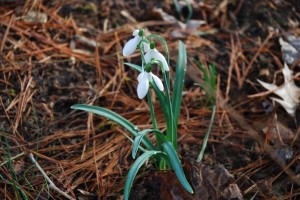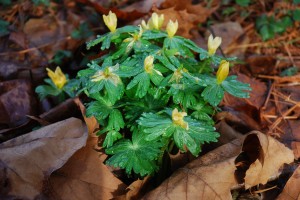Companion bulbs, often called “minor bulbs”, are early signs that spring is coming. Three of the most reliable are snowdrops, winter aconites and Glory of the snow. They bloom before crocus.
Winter aconite (Eranthis hyemalis) returns with floral beauty less than three months after planting. Plants poke through the ground, grow and flower 3 to 6 inches high and wide. Bright yellow cup-shaped flowers appear in mid- to late winter. Green leaves emerge as the flowers begin to fade. All evidence of their presence disappears by late spring, when the bulbs go dormant.
Pure white, nodding, bell-like snowdrops (Galanthus nivalis) often peak through the winter snow in February. Leafless 3-4 inch stems support individual flowers. Plants grow only 4-6 inches high with 2-3 strap-like leaves.
Glory-of-the-Snow (Chionodoxa forbesii) is so-named because, in northerly areas, their bright blue six-petalled flowers poke up through the snow in the winter. Bulbs and seeds often spread very aggressively.
Bulbs are planted 3-4 inches apart and 2-4 inches deep in the fall. Sow in large numbers for maximum flowering impact under trees and shrub and in perennial beds. They should receive full day winter sunlight. All three companion bulbs are critter proof, not bothered by deer and voles. All are hardy in USDA hardiness zones 3–7. They often naturalize and the planting can last a lifetime.
All companion bulbs prefer compost-rich soil that is well-drained and moderately moist. Before planting pre-soak the bulbs overnight to hasten germination.
Snowdrops, winter aconites, and Glory of the snow are native to southern and eastern Europe.



 Posted in
Posted in 
